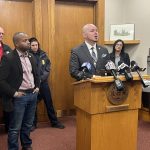Wisconsin Health Officials Urge Holiday Caution Amid Respiratory Illness Spread
COVID-19, RSV and the flu are all spreading.

Wisconsin Examiner Photo
As the year-end holiday season closes in, respiratory illnesses — COVID-19, but also influenza and respiratory syntactical virus (RSV) loom as likely unwelcome guests at family gatherings into the new year.
The state health department’s weekly report on respiratory illnesses in Wisconsin, issued Friday, shows that all three of those viral maladies are increasing, Tom Haupt, respiratory disease epidemiologist for the Wisconsin Department of Health Services, told reporters in a media briefing Thursday.
On Friday, DHS announced that the department had confirmed a pediatric death from RSV and reiterated the importance of preventive measures to avoid the spread of all three illnesses.
There’s no sign yet that any of them are leveling out. “Everything is still on a pretty steep increase over the past few weeks, and we expect that to continue into the new year as well,” Haupt said.
It’s a bad time for that, he acknowledged, since this is a time when people are accustomed to gathering with family and friends to mark the holidays.
The health department urges people to wash their hands thoroughly to help prevent the spread of germs and to stay home if they’re coughing, sneezing, have a runny nose or other symptoms.
And while there are no mask mandates in place, people should not hesitate to wear masks, particularly in larger groups, on airplanes and in airports and in other public transportation, Haupt said.
“Have a mask available if you feel uncomfortable in an area that has a lot of people around you, or you hear people who are coughing and not covering their mouths. And there’s nothing wrong with putting a mask on at any time,” he said. “We don’t want people to go out into the public and to expose people, especially people at high risk of complications.”
The increasing spread of illness has been documented in reports from health providers and, for COVID-19, in surveillance of wastewater around the state.
Based on past history, the health department expects to see RSV and flu peak in mid- to late January, Haupt said. COVID-19 is still new, and a new variant — labeled JT-1 — is becoming the predominant strain in Wisconsin and the U.S. that researchers are just beginning to understand, he added. But public health officials are “hopeful that we will see peak activity in January along with the other viruses, and we will start seeing a decline shortly after that.”
COVID-19 and influenza both appear to be affecting all age groups, but “a little bit more towards the older population,” Haupt said. COVID-19 hospitalizations are increasing, and about 500 Wisconsin residents have been hospitalized for influenza, most of them older. That number is likely to increase, he added.
Meanwhile, RSV “is really hitting the children very hard, especially those under 5 and then even going farther than that, those children who are under 2 years old.”
Children have been hospitalized, with some in pediatric intensive care and some put on ventilators to help them breathe, Haupt said.
Haupt said DHS and local public health providers are working to get the word out to more Wisconsin residents to get updated vaccines, particularly COVID-19 and flu. He said it has been “concerning, and it’s actually disappointing,” that only about 20% of Wisconsin residents overall have received the updated COVID-19 vaccine. Influenza vaccines have also been very low this year, he added.
“We know that the vaccine is safe,” Haupt said of the latest COVID-19 shot. “The vaccine in and of itself doesn’t always prevent illness, but it will keep people from [needing to seek] medical attention [and] from being hospitalized.”
The vaccine is fully effective in 10 days to two weeks, he added. “It’s not too late to be vaccinated at this particular point.”
State health department urges holiday caution with rising respiratory illness was originally published by Wisconsin Examiner




















